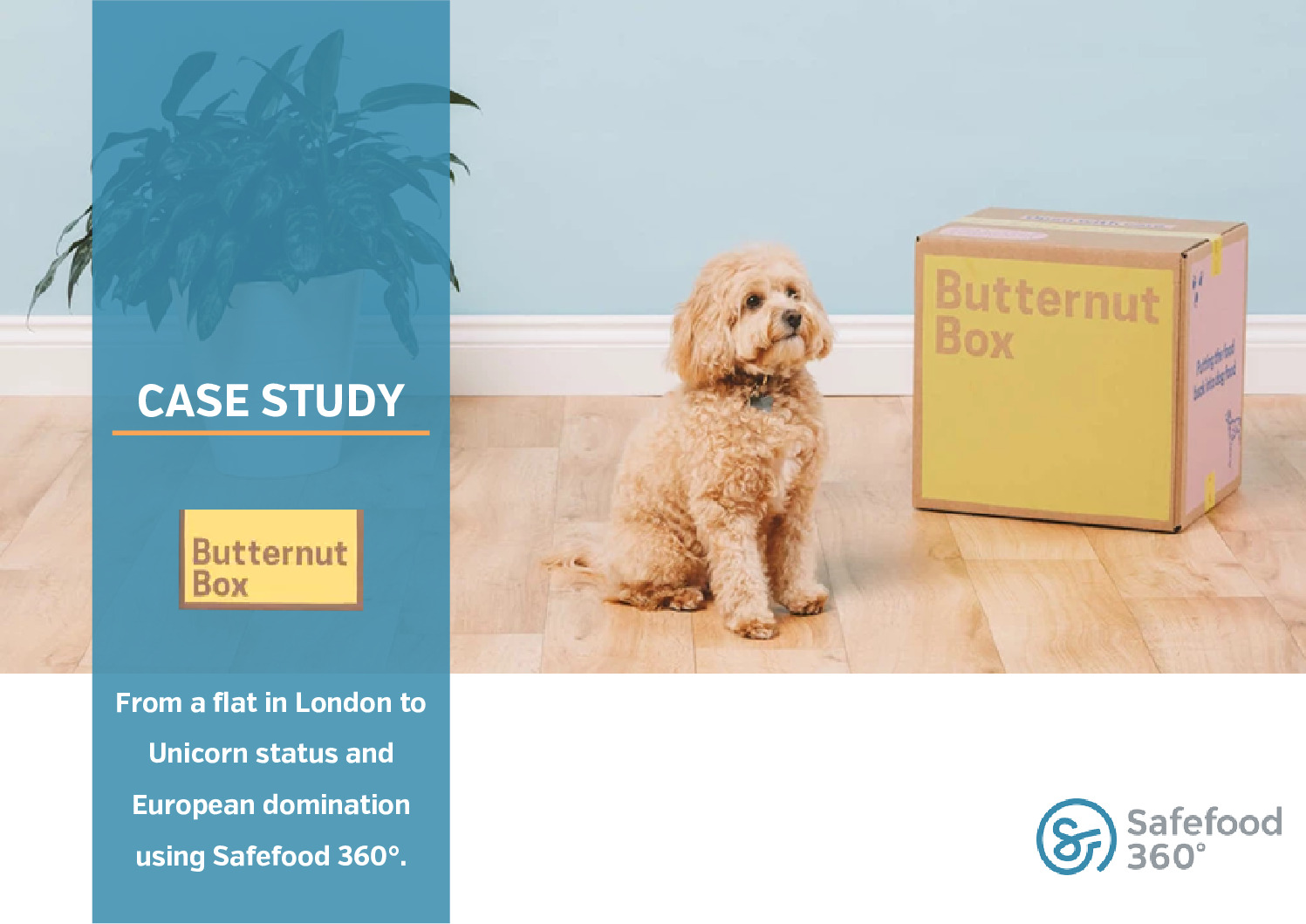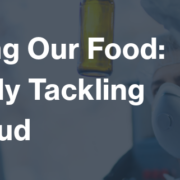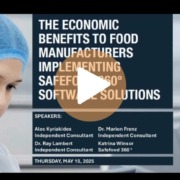The Costs of Food Safety Non-Compliance: How to Avoid Financial Pitfalls
Compliance to food safety regulations is not only a legal requirement but it is also a crucial factor in protecting your brand’s reputation and ultimately, its financial health.
It goes without saying, but more importantly than anything, it is also an ethical requirement and a reminder of WHO’s mission of recent years that food safety is everyone’s business.
However, although the vast majority of production is done with the best of intent, sometimes, and unfortunately, either through design, accident or happenstance, noncompliance is unavoidable.
When this happens, there are real world costs that can quickly accumulate.
Beyond just the cost of a recall itself, the hidden costs of non-compliance can be substantial and wide ranging to your organisation.
In the blog below, we look at some of the direct and indirect financial impacts of non-compliance and what proactive compliance measures and strategies can be adopted to mitigate these risks.
The Direct Financial Impact of Food Safety Non-Compliance
The financial repercussions of food safety non-compliance can significantly damage the future of a company.
No matter where you are producing or exporting products to, understanding what these are will help you to highlight and stress the importance of preventive measures when making any process changes or submitting any business proposal.
- Fines, Penalties and other Fees
Failure to comply with food safety regulations can lead to substantial fines and penalties from regulatory authorities.
In the absolute worse case scenario, your business may need to cease production either while an investigation is occurring, or while the appropriate steps are taken to redress and fix the nonconformance’s you have attained.
If levies or fines are applied, these financial repercussions can quickly add up and place significant strain on your company’s budget.
For instance, the US Food and Drug Administration (FDA) has not been shy in the past to issue fines that can reach millions of dollars for serious violations.
Needless to say, if money is tight, this may impact your future plans and initiatives as well.
- Product Recall Costs
Recalling products from the market due to safety concerns is one of the most immediate and severe financial repercussions following a non-compliance incident which can be harmful.
When this happens the expenses related to logistics, disposal and the production of replacement goods can quickly rack up.
Typically, small businesses tend to make up the majority of cases where goods are recalled and unfortunately, these are often the ones that are most affected.
In the past the median costs of recalls have been estimated anywhere from $33,000 to $10 million USD.
- Legal Fees
Without casting aspirations, a quick google search can easily highlight unfortunate real world scenarios where companies, either willingly or unwittingly non complying have found themselves bankrupt once the dust has settled and their costs have to be processed.
In tragic circumstances with bad actors intentionally acting without regard, this can result in life long jail sentences, but even in the more earnest scenarios, the legal processes can have serious impact.
If you find yourself the unfortunate position of having legal action taken against you there can be a host of charges, fees and sunken costs that quickly accrue.
If your company already has inhouse legal counsel, some of these costs are lessened by not having to go externally, but there might be an opportunity cost to your business where the time and energy of these resources may be spent on other value serving activities.
Of course, even if you are in a defendable situation and manage to resolve relatively unscathed, you may still need to compromise through settlements or damages.
The Indirect Financial Impact of Food Safety Non-Compliance
While the direct financial impacts of food safety non-compliance, such as fines, recall costs, and legal fees, are readily identifiable, the indirect costs can often be more insidious yet equally detrimental to a company’s financial standing.
These indirect implications can arise from diminished consumer trust, increased insurance premiums, and the loss of market opportunities, all of which can compound over time.
A brand that suffers from non-compliance may find itself navigating a lasting reduction in customer loyalty, as consumers become increasingly wary of products that compromise their health and safety.
Furthermore, the financial strain placed on resources during compliance investigations and remediation efforts can divert capital away from innovation and growth initiatives.
By understanding these indirect financial impacts, businesses can implement robust food safety strategies that not only ensure compliance but also enhance brand resilience in an increasingly competitive marketplace.
- Brand Reputation Damage
Consumer trust is essential the to the health, success and overall survival of your brand, but in an age of increased access to information and awareness, trust in the food industry is rapidly decreasing.
Your brand reputation may suffer following any incident that causes any level of adverse effect on a consumer.
Regardless of the severity of the incident itself, whether it’s a food safety issue, or even just a breach of Packers rule, the impact and relationship with the consumer can have a long lasting affect.
Consumers tend to lose trust in brands associated with food safety incidents such as recalls and lack of transparency, and when this happens, it may quickly translate to decreased sales and market share.
- Loss of Consumer Trust
Once consumer trust is compromised, regaining it can be a significant task.
Scandals such as horse gate, recalls, and overall increasing costs under the guise of inflation despite record profits have all affect consumer sentiment.
In today’s digital age, where information spreads rapidly, the repercussions of losing consumer trust can be particularly severe, impacting a brand’s reputation for years to come.
Still it is not all doom and gloom and there are options to repair this.
With technology so ever present at every step of the food supply chain and in the hands of consumers post consumption, there are more opportunities than ever to reach the consumer and engage them to dispel this scrutiny.
While proprietary production processes need to be protected, your brand can now meet these consumers where they are, and provide clarity in more ways than ever before.
As Dan Farney, the chair of the United Soybean Board has said, “we can all play distinct and important roles in regaining consumer trust”.
To regain trust, companies must prioritize transparency and effective communication, often combined with self-sanction actions and clear information-sharing strategies.
However, as indicated by IFT, rebuilding trust is challenging, especially when consumers are overwhelmed with negative information.
How you deal with a crisis and the relationships you have already created in advance of it which are based on trust and true influence can be the key in consumer sentiment and the decision to give you a second chance, before you ever compromised your first.
- Business Disruption Costs
This almost goes without saying as it is the common thread through all of the above reasons, but any unplanned event is a disruption that takes time, energy and resources away from your business plans.
Hopefully, the disruption is minimal and your business can contain and pivot exposure to the affected product, production line or site, but it could be wise to consider the ripple effect that may emanate when this happens.
When an unfortunate event occurs, whether it’s a halted production line, supply chain interruption, or workforce inefficiencies, the important thing is you are ready and in position to deploy a responsive and well-constructed action plan.
Strategies to Mitigate Risks and Avoid Financial Pitfalls
It is wise for all businesses to incorporate contingency plans and strategies for events.
Ignoring their invaluable use when needed, their preparation and maintenance has an opportunity cost that must be associated to them.
Naturally, it should be hoped they will never be needed, and in which case, the work could be perceived by some to redundant, but in the planning and preparation of these, there are opportunities to review processes and make adjustments for improvement.
Implementing effective strategies to mitigate risks associated with food safety non-compliance is crucial for maintaining operational integrity and financial stability.
Proactively addressing the risks through robust systems, process improvements, risk analysis, audits and application of Six Sigma principles will allow you to create a solid foundation that mitigates and all but eliminates the adverse impacts you may have.
The following points outline key strategies that organizations can adopt to enhance their food safety practices and safeguard against significant losses.
- Implementing Robust Food Safety Management Systems
Implementing robust food safety management systems like BRCGS, SQF, or FSSC2200 or any other GFSI recognised scheme can significantly enhance your compliance efforts.
Each of these schemes have its own advantages and provide a passport to your organisation to do business with retailers globally who will have assurance and confidence that you are doing and striving to do the best at all times.
Once implemented these schemes require vast amounts of documentation and resources to maintain and can be a struggle for many businesses.
If this is happening to you or you would like to pre-empt this, our digital solutions can eliminate a lot of this non value added time by providing real-time analytics, automating compliance checks, and centralizing documentation, ensuring your operations consistently meet and exceed global standards.
With Safefood 360°, you not only streamline your processes but also foster a culture of food safety excellence, empowering your team to make informed decisions and respond swiftly to regulatory changes.
- Regular Training and Education for Staff
Continuous training is crucial in keeping staff informed about the latest regulations and best practices.
By investing in regular educational programs and workshops, organizations can significantly mitigate all risks throughout their organization.
Training is a cost but continuous investment in your people will endear them to your operations and provide continuous benefit to your bottom line.
This should overall reduce employee churn and increase the output of employees as they add enhanced value to your operations.
One of the conditions of GFSI schemes is that you maintain regular training logs and records that can demonstrate the improvement you are putting into your people.
When this happens, again we are able to help with our training module which can take care of these admin tasks for you and free up your time to focus on other value added activities.
- Conducting Regular Audits and Inspections
Internal and external audits are crucial for identifying potential compliance issues before they escalate into significant problems.
Regular inspections help maintain high standards and prompt corrective actions when necessary.
Strong and versatile audit workflows provide a comprehensive solution for managing food safety and quality audits.
By leveraging this technology, businesses can easily schedule, conduct and track inspections, ensuring all standards are met consistently.
For example, following the implementation of Safefood 360°, Bluegrass Ingredients enhanced their auditing processes and now achieve consistent SQF scores of either 98 or 99 annually.
Regular audits not only mitigate risks but also prepare companies for success in an increasingly regulated environment.
- Building a Culture of Food Safety
To effectively foster a culture that prioritizes food safety across all levels of the organization, it is crucial for leadership to take a proactive stance.
This includes not only reinforcing the importance of compliance but also actively encouraging employees to engage in food safety practices.
By embedding food safety into the organizational ethos, companies can ensure that every team member understands their role in maintaining high standards.
As outlined from our sister company BRCGS, a strong food safety culture goes beyond mere adherence to regulations and is more than just a process.
It drives accountability and promotes continuous improvement, helping organizations mitigate risks and enhance their overall performance.
For more insights, you can read the full article here.
Sustaining Compliance for Future Success
The hidden costs of food safety non-compliance reach far beyond immediate financial penalties, touching on aspects of brand reputation, consumer trust and long-term profitability.
As the examples in this blog have shown, the repercussions of failing to maintain rigorous food safety standards can be both immediate and sometimes irreparable.
For food businesses to thrive in an increasingly regulated environment, proactive measures are not just advisable – they are essential.
Implementing robust food safety management systems certified under the GFSI would be the first step to protecting your brand and helping to ensure better outcomes.
Once this is established, your business may need help sustaining or growing from that.
In these instances, there are a plethora of options out there from consultations to custom workflows and solution.
Our software solution is one of these which offers a custom off the shelf solution tailored to the food manufacturing industry.
Backed by domain expertise and food safety, we offer full support to set up, deploy, and maintain your system so you can ensure your digital transformation is successful.
By further embedding these practices into the core of your operations, you can create a culture of continuous improvement, where every team member is not only informed but also empowered to uphold the highest safety standards.
Such proactive approaches do more than protect against financial pitfalls; they build a resilient brand that consumers can trust, even in challenging times.
The importance of food safety is underscored by the severe reputational risks which can ultimately affect financial performance.
By investing in the right tools, training, and systems today, your company can secure its future success, ensuring that it not only meets but exceeds the expectations of regulators and consumers alike.
In conclusion, Safefood 360° doesn’t just support compliance – it propels your business toward excellence, safeguarding your brand’s reputation, fostering consumer loyalty, and driving sustained profitability.
The question is no longer whether you can afford to invest in food safety compliance, but whether you can afford not to?
—
To learn how Safefood 360° can strengthen your compliance strategy and protect your business from the hidden costs of non-compliance, sign up for a free demo today and take the first step towards a more secure and profitable future.













Leave a Reply
Want to join the discussion?Feel free to contribute!